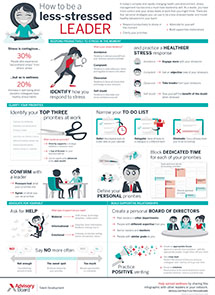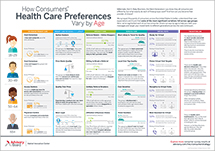Auto logout in seconds.
Continue LogoutYounger U.S. adults are reporting higher levels of stress than older U.S. adults—and are more likely to have received care from a mental health professional, according to the American Psychological Association's (APA) Stress in America survey released last week.
Survey details
APA since 2007 has commissioned a national survey to evaluate the country's state of stress. The survey assesses the impact of stress on the general public, determines leading sources of stress, identifies how the public manages stress, and measures perceptions of stress. The Harris Poll conducted the latest survey on APA's behalf between July 27 and Aug. 28. The online survey included responses from 3,458 U.S. adults.
The survey groups data based on generations. The survey defines:
- Generation Z as respondents between the ages of 15 and 21;
- Millennials as respondents between the ages of 22 and 39;
- Gen Xers as respondents between the ages of 40 and 53;
- Baby boomers as respondents between the ages of 54 and 72; and
- Mature or older adults as respondents ages 73 and older.
How stressed are US adults?
The survey found that millennials on average reported the highest level of stress at 5.7 out of 10, while mature and older adults on average reported the lowest stress level at 3.3.
The survey found the average level of stress respondents perceived as healthy increased from 3.7 in 2017 to 3.9 in 2018, which researchers said could suggest U.S. adults have an increased tolerance for stress. According to the survey, Gen Zs were more likely to report their mental health as fair or poor than millennials, Gen Xers, Baby Boomers, and mature or older adults.
The survey also found Gen Zs were more likely to report that issues in the national news were causing them stress than adults overall. According to the survey:
When asked about common every day stressors, the survey found Gen Zers were more likely than adults overall to cite money, work, and health care-related concerns as a significant source of stress.
Gen Zs more likely to seek mental health care
According to the survey, Gen Zs were more likely to report receiving or having received treatment or therapy from a psychologist or mental health professional than those of other generations.
The survey also found Gen Zs were more likely than some other generations to report having been diagnosed with an anxiety disorder, and were more likely than all other adult generations to report having been diagnosed with depression.
The survey found that more than 64% of adults overall said they do enough to manage their stress levels, but about 20% of adults said they do not.
Why is Gen Z more stressed?
Arthur Evans, a psychologist and CEO of APA, said, "The pressures facing Generation Z are different from those that faced older generations at the same age. For example, mass shootings simply did not happen with the same scale and frequency when I was in school."
Two mass shootings that gained national media attention occurred shortly before and shortly after the survey was released on Oct. 30. Just days before, on Oct. 27, a gunman opened fire in Pittsburgh synagogue. The week after the survey was released, a gunman on Nov. 7 killed at least 12 people in a shooting at a bar in Southern California. The shooting took place during "College Country Night."
Evans said another reason Gen Z is reporting higher levels of stress is because their brains still are developing and are incapable of handling the same levels of stress as older adults. "While young people are facing many of the same issues that older adults face, they have not yet had the life experiences that many older adults have had, such as practice responding to and coping with a broad range of stressors," he said.
Evans added, "The fact that more Gen Z individuals than adults in other generations said that they thought their mental health was fair or poor is concerning. However, this could also be interpreted as a positive sign. This generation may be more tuned in to recognizing issues with their mental health than older generations" (Diaz, CNN, 10/30; Ducharme, Time, 10/30; Resnick, Vox, 10/31; Becker et al., Washington Post, 11/8; Del Real et al., New York Times, 11/8).
What your patients expect from their care—from millennials to Gen Z
Millennials, Gen X, Baby Boomers, the Silent Generation—what exactly do each of these groups want from their health care?
We surveyed thousands of consumers across the United States to find out. Download this infographic to learn how to tailor your messages and target your investments to each generation.
Don't miss out on the latest Advisory Board insights
Create your free account to access 1 resource, including the latest research and webinars.
Want access without creating an account?
You have 1 free members-only resource remaining this month.
1 free members-only resources remaining
1 free members-only resources remaining
You've reached your limit of free insights
Become a member to access all of Advisory Board's resources, events, and experts
Never miss out on the latest innovative health care content tailored to you.
Benefits include:
You've reached your limit of free insights
Become a member to access all of Advisory Board's resources, events, and experts
Never miss out on the latest innovative health care content tailored to you.
Benefits include:
This content is available through your Curated Research partnership with Advisory Board. Click on ‘view this resource’ to read the full piece
Email ask@advisory.com to learn more
Click on ‘Become a Member’ to learn about the benefits of a Full-Access partnership with Advisory Board
Never miss out on the latest innovative health care content tailored to you.
Benefits Include:
This is for members only. Learn more.
Click on ‘Become a Member’ to learn about the benefits of a Full-Access partnership with Advisory Board
Never miss out on the latest innovative health care content tailored to you.


